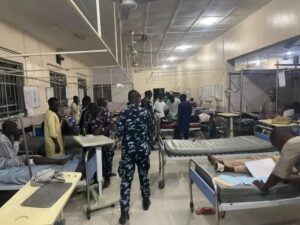TWO YEARS OF TINUBU’S PRESIDENCY: The Impacts of its Economic Reforms on the Nigerian People

By Yinka Olatunbosun , Ph.D
When President Bola Ahmed Tinubu assumed office on May 29, 2023, he promised to “renew hope” for Nigerians through bold economic reforms. However, two years into his administration, many of these policies have had devastating effects on the average Nigerian. Though some reforms were deemed necessary for long-term macroeconomic stability, their poor timing, lack of safeguards, and harsh implementation led to widespread hardship.
One of Tinubu’s first major economic moves was the abrupt removal of the fuel subsidy on inauguration day. This was intended to free up funds for infrastructure and social investment, and curb corruption in subsidy management. This economic decision expectedly led to the soaring of fuel price whereby petrol prices skyrocketed from about ₦185 per litre to over ₦600 per litre in many states.
The removal of fuel subsidy also resulted to worsening inflation triggering a ripple effect with inflation climbing to over 33% which is the highest so far since return to democratic rule in 1999. It is pertinent to say that there have been massive job losses due to the country’s unfavourable economic situation. Many small businesses have either reduced staff or shut down in the last two years.
It is sad to note that the nation has experienced increased poverty as over 70 million Nigerians now live in multidimensional poverty.
Tinubu’s government merged the multiple exchange rates to allow market-driven pricing, thereby plunging the Naira from ₦460/$ to nearly ₦1,500/$ leading to prices of imported items such as medicine, electronics, and food skyrocketing.
Nigerian students schooling abroad are now facingtripled expenses. Meanwhile, there has not been any meaningful tangible foreign investmentattracted as Investors’ confidence remained low.
The Tinubu’s government being insensitive to the plight of the people, approved a hike in electricity tariffs under the guise of cost-reflective pricingwhich brought about unaffordable bills. Nigerians now pay tripled bills despite the fact that there is no improvement in power supply. Power supply has remained erratic. This has caused business strain for SMEs due to increased operational costs.
While agricultural transformation was promised by the APC-led government under Tinubu, little was done to curb food inflation and insecurity. Theprices of staple foods have doubled or tripled.There is so much insecurity in our farms arising from farmers and herdsmen incessant clashes and banditry displacing thousands of farmers.
Though palliatives and cash transfers were promised, implementation was poor and riddled with controversies. Selective distribution was the order of the day making many vulnerable Nigerians received nothing. Transfers were too small to be meaningful thereby having negligible impacts. There were grievous corruption allegations on the mismanagement of social schemes.
The APC-led government under Tinubu has shown signs of authoritarian tendencies, particularly in its handling of critics and protest movements. Labour unions and civil society groups staged protests and strikes in response to economic hardship. These industrial actions no doubt disrupted public services in education and health thereby causing distrust in Government. Citizens view the administration as insensitive.
ATTENTION: Follow 9jaReporters on Instagram for a chance to win ₦100,000 in our Top Fans Challenge!
JOIN NOW to participate and stand a chance to win exclusive prize ons, free airtime, and exciting gifts!
FOLLOW US TODAY! DON’T MISS OUT!
Despite promises of tackling insecurity, violent attacks and kidnappings have persisted under President Tinubu’s watch. Many rural communities remain under siege, and no high-profile security officials are held accountable. Insecurity continues to threaten livelihoods in various regions of Nigeria.
Regardless of the economic hardship faced by Nigerians, the Tinubu administration has moved to increase taxation in various sectors. From VAT to telecommunications levies, and customs duties, Nigerians are being burdened with higher costs at a time when disposable income is shrinking.
While reforms are sometimes painful, they must be guided by empathy, strategic planning, and inclusive dialogue. Unfortunately, the APC-led administration under President Bola Ahmed Tinubu has demonstrated a troubling pattern of policy decisions that favour the elite while punishing the masses. Until there is a radical shift in focus towards the needs, voices, and pains of the Nigerian people, the legacy of the Tinubu-led government risks being written as one of economic hardship, disconnection, and social injustice.
Dr. Yinka Olatunbosun was the Labour Party Candidate in Ife East Local Government for the Osun State House of Assembly during the last general election in 2023.



